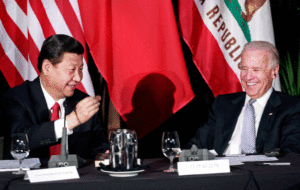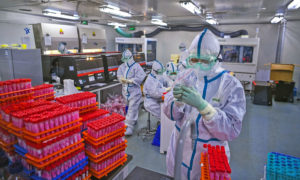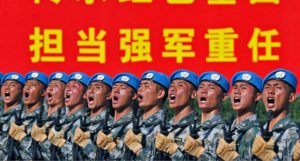His audience hung on his every word. Here was one of Britain’s foremost weapons experts chairing a prestigious, two-day conference devoted to exploring new ways of making arms more deadly. But the packed conference hall, its walls lined with oak and marble, wasn’t in Britain. It was in Jinan, the capital of Shandong province in eastern China.
Clive Woodley, 67, currently attached to the Department of Shock Physics at Imperial College in London, has worked on high-tech weaponry since his youth. So he had much to say about the conference theme: “New Material Technology for Ammunition.” The event “marked a new chapter in the development of artillery, shells and missiles”, according to an official report issued afterwards.
Most of Woodley’s research has been funded by the Ministry of Defence. A former president of the International Ballistics Society, he served as Chief Scientist at the MoD-controlled company QinetiQ from its inception in 2001 — when the MoD privatised its own labs — to 2018. He has advised the MoD about many of its key lethal systems.
Woodley’s contributions in Jinan followed a grand opening ceremony conducted by Qi Xiaoliang, the Communist Party Secretary of the Shandong Institute, one of China’s top military research centres. Joining him, the conference literature makes clear, was almost every leading figure in the Chinese weapons industry, including key figures from Norinco, a Chinese state-owned giant that makes tanks, fighter jets, drones, missiles, big guns, and bombs. Another sponsor was the China Ordnance Society, which brings together 22,000 researchers from both China’s universities and its arms firms, all devoted to “fostering the development needs of national defence”.
Most extraordinary of all was the timing. In 2012, and for some years afterwards, Britain and China basked in a “golden age” of warm relations initiated under David Cameron. China was not then so widely known for the genocide of its Uighur Muslim minority, nor had it crushed Hong Kong’s freedoms. It was not until 2020 that the UK government decreed that equipment made by the Chinese telecoms firm Huawei must be ripped out from Britain’s 5G networks on grounds of national security.
However, the conference in Jinan took place very recently, on 14 and 15 October 2021. It was supposedly “international”, but in fact, the only non-Chinese delegates were Woodley, a Russian and a Pole. A few weeks later, MI6 chief Richard Moore gave a landmark speech, saying the threat from China was now his agency’s “single greatest priority”, and warning that we must beware of “large-scale espionage operations against us, targeting those in research of particular interest to the Chinese state” — in other words, experts such as Woodley.
Yet the Jinan event was no one-off. Working with an expert who is fluent in Mandarin, I have established that over the past eight years, Woodley has participated at least seven times in seminars and lectures for senior figures from China’s defence industry and university departments that work with its military. He is also a co-editor of two Chinese journals funded by weapons firms. Since 2014, he has had eight papers either published in Chinese journals or co-written with Chinese scientists working with Chinese arms makers — the most recent, in 2021.
And Covid rules permitting, Woodley will soon be jetting off yet again to Beijing. There, over four days in July, he will co-chair the International Conference on Defence Technology, presiding over sessions covering the latest discoveries in sensitive military technologies. Helpfully, Woodley lists their subject areas in his “welcome letter” on the conference website. They include hypersonic weapons (as deployed by the Russians with lethal effect in Ukraine), “explosions and impacts”, new types of armour, quantum computing and “wound ballistics”.
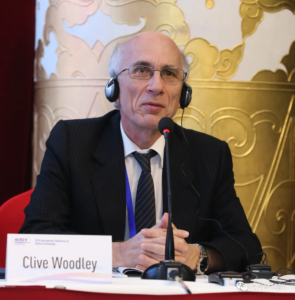
Just as in October, most of those in attendance will be from China’s weapons industry: Woodley’s co-chairs will be two of China’s most eminent defence scientists, Feng Changgen of the Beijing Institute of Technology and Li Baoming of Nanjing University and the Ordnance Science and Research Academy of China. Both are high-ranking members of the Communist Party, and their careers have been dedicated to China’s military.
In recent months, newspapers have carried many stories about China’s involvement with British academics and universities, and the risks this may pose. But until now, Woodley’s activities have gone unreported. The MoD says it does not recognise they might pose any risk. Its spokesperson refused to answer a single question about Woodley’s involvement with China, other than to say: “We have robust procedures in place to make sure research contracts do not contribute to overseas military programmes and that individuals or organisations with foreign-state links cannot access our sensitive research… we ensure that stringent vetting checks are carried out.”
Imperial College said: “We take our responsibilities to UK national security seriously”, but also refused to answer questions. Its spokesperson added, somewhat bizarrely, that when Woodley wrote papers jointly with Chinese colleagues, he “should not have used” his Imperial College title. Here, Woodley appears not to have got the memo: for the forthcoming Beijing conference, he is, as usual, billed as an Imperial researcher.
As for QinetiQ, its spokesperson said the firm had “robust processes in place to vet our people and their activities both within and outside the business”. He said that Woodley was working there, and that he “frequently engaged with a number of other countries across the world, working collaboratively to support the international scientific community. Our UK Defence customer was both aware of and supportive of all these activities.”
Others, however, have expressed concern. A former senior MI6 officer told me: “The fact there have been not just one or two talks but a consistent and continuing pattern of meeting and contact is deeply concerning. I can’t think of another case where a British lecturer has visited China many times to talk about weapons technology, nor written papers about it in Chinese journals.”
Woodley’s intentions, he went on, were, presumably, innocent: a desire to share research with colleagues abroad. But he was, the former official added, at best deeply naïve: “An open relationship, with talks or lectures in scientific forums, can all too easily be a cover for attempts by a hostile intelligence service to conduct more in-depth discussions. To me, this looks like a classic example of the way China’s intelligence service works.”
He added that China may have tried to steal data from Woodley’s laptop or phone during his visits there, without him even knowing it: “Business people travelling to China are always advised to take only burner phones and computers with no sensitive data on them.”
Indeed, in 2013, the year before Woodley’s work with China began, it emerged that Chinese spies had stolen vast amounts of sensitive information from his then employer QinetiQ by hacking its computer system via two employees’ laptops. They stole 13,000 QinetiQ server passwords and acquired more than 1.3 million pages of documents.
I shared my findings with the Tory MP and former army officer Tom Tugendhat, chairman of the Commons Select Committee on Foreign Affairs. He said that after this article was published, his committee would investigate. Tugendhat said: “This case raises serious concerns about the integrity of our military secrets and the level of cooperation between a British expert and a potentially hostile state, and we will be looking into what exactly has happened — and why no one has raised such concerns before. No one could say his work is dual use. His career has had one end only — the development of weapons.”
Woodley’s activities are particularly concerning, given his long-standing reputation as a giant in his field. His contributions have included the development of plasma-powered cannons, fired by high-voltage electric pulses in place of old-fashioned explosives; ingenious ways of improving firing mechanisms and shells using mathematical modelling, so that big guns can be targeted more accurately; and ways of increasing the violence and speed of their shells’ detonations. Another of his areas of expertise is railguns — next generation hypersonic artillery weapons that fire projectiles at six times the speed of sound, so that a shell fired from London would land somewhere in Manchester in just over a minute.
There is, it should be noted, no suggestion that Woodley has disclosed classified information, or consciously tried to damage Britain’s national interest. Nevertheless, it is a fact that China has acquired a decisive lead in the race to deploy railguns. In 2020, it revealed a prototype mounted on a naval vessel and said it planned to deploy these “superguns” widely by 2025. Britain and America are said to be lagging far behind. In 2019, Woodley delivered a conference paper co-written with Li Baoming and his Nanjing University colleague Qin Linhua. Its title? “Recent Update on the Multi-Physical-Model of Electromagnetic Railgun.”
Woodley has been visiting China since 2014, when, Mandarin websites say, he gave “an important lecture” to scientists from Norinco. The same year, he joined the editorial board of a journal published in Mandarin, The Chinese Journal of Explosives and Propellants, co-owned by Norinco and the China Ordnance Society. The head of both institutions is a senior member of the Communist Party, Jiao Kaihe.
Woodley’s first paper for the journal was published in its December 2014 issue. It described how microscopic particles of aluminium could speed the detonation of explosives, and so make guns more deadly. The paper stated that this innovation would be “of great benefit to all small arms, medium calibre and large calibre gun systems including naval guns, land-based artillery and direct fire guns”. The paper’s acknowledgements stated: “This work was funded by the Defence Science and Technology Laboratory (DSTL), part of the UK MoD, under the Hazard Modelling and Simulation task of the UK Energetics (UK-E) programme.”
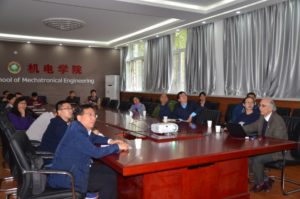
Woodley published another paper in the same journal in 2015, and a third in 2018, about mathematical modelling of the behaviour of guns and explosives. His last Chinese Journal of Explosives paper to date, published last August, dealt with new forms of explosives in what were termed “closed bombs”. It was co-written with four Chinese experts from the Xi’an Modern Chemistry Research Institute, part of Norinco. The Institute’s website says it is “China’s largest comprehensive research institution working on explosives and damaging combustion technologies”.
Meanwhile, in 2016 Woodley authored a paper in a second Chinese journal, Defence Technology, which is sponsored by the weapons industry body, the China Ordnance Society. It discussed the use of explosives at low atmospheric pressures and in temperature extremes, stating it was based on research “funded by the MoD”, under its “Weapons Science and Technology Centre” (WSTC).
He also became one of the journal’s three executive editors, along with the two scientists who will be co-chairing the conference with him in July, Li Baoming and Feng Changgen. Feng is a former member of China’s puppet parliament, the Standing Committee of the National People’s Congress, and is based at the Beijing Institute of Technology, one of China’s “seven sons of national defence” — universities with especially close military links and numerous top secret military labs. He sits on the Science and Technology Committee of the State Administration for Science, Technology and Industry for National Defence, which coordinates China’s weapons research.
Until the pandemic, Woodley visited China almost every year. In 2015, he attended the autumn seminar at the State Key Laboratory of Explosion Science, part of the Beijing Institute of Technology. The following year he gave a week-long series of seminars at Li Baoming’s lab in Nanjing about his work at QinetiQ — which, photos reveal, were illustrated with slides bearing the QinetiQ logo. According to reports in Mandarin, as well as his lectures and seminars, he held private talks with his Chinese colleagues.
In 2018, he co-chaired the first International Conference on Defence Technology in Beijing, together with Feng and Li. The event was sponsored by Norinco, the China Ordnance Society, and the China South Industries Group Corporation, another major weapons maker. The event was attended by personnel from Norinco, several “seven sons” universities, and the Army Engineering University, which describes itself as “the premier research and educational institution for the PLA Ground Force”. The second of these conferences, in the autumn of 2020, had to be held online thanks to the pandemic. By then, the “golden age” was well and truly over, amid emerging evidence that China had concealed the true source of the Covid outbreak. Nevertheless, Woodley was there.
I have tried repeatedly to ask Woodley questions about his publications and trips to China in a series of emails. When he failed to respond, I visited his home in Kent. He told me that if I didn’t leave he would call the police, slammed the door in my face, and refused to accept my questions in writing. Among the things I had wanted to ask were whether he has received any payment for his work with Chinese colleagues and journals; what security precautions he has taken during his visits; and whether he considers collaborating with researchers from China is any different to working with experts from countries allied with Britain.
Charles Parton, a former diplomat and China expert at the Royal United Services Institute, who has written extensively on the need for the UK to improve its defences against China, told me that the curious case of Mr Woodley “requires urgent investigation and explanation. What was discussed with whom and in what terms? Were any benefits received? It also shows badly we need to up our defences. We need to define the areas of scientific research where we can cooperate with Chinese scientists and those which we must rule out on security grounds.”
Espionage expert Professor Anthony Glees, the founder of the Institute for Intelligence and Security Studies at Buckingham University, added: “Engaging with China over weapons research today represents the height of folly and could have potentially catastrophic consequences. Even with the best intentions, Woodley’s visits to China and his relationships with those who are bound to be Chinese intelligence assets places him in the utmost danger.”
As the scale of the strategic threat China poses becomes clearer, it may just be that Woodley’s friendships could have endangered the rest of us, too.
Disclaimer
Some of the posts we share are controversial and we do not necessarily agree with them in the whole extend. Sometimes we agree with the content or part of it but we do not agree with the narration or language. Nevertheless we find them somehow interesting, valuable and/or informative or we share them, because we strongly believe in freedom of speech, free press and journalism. We strongly encourage you to have a critical approach to all the content, do your own research and analysis to build your own opinion.
We would be glad to have your feedback.
Source: UnHerd Read the original article here: https://unherd.com


